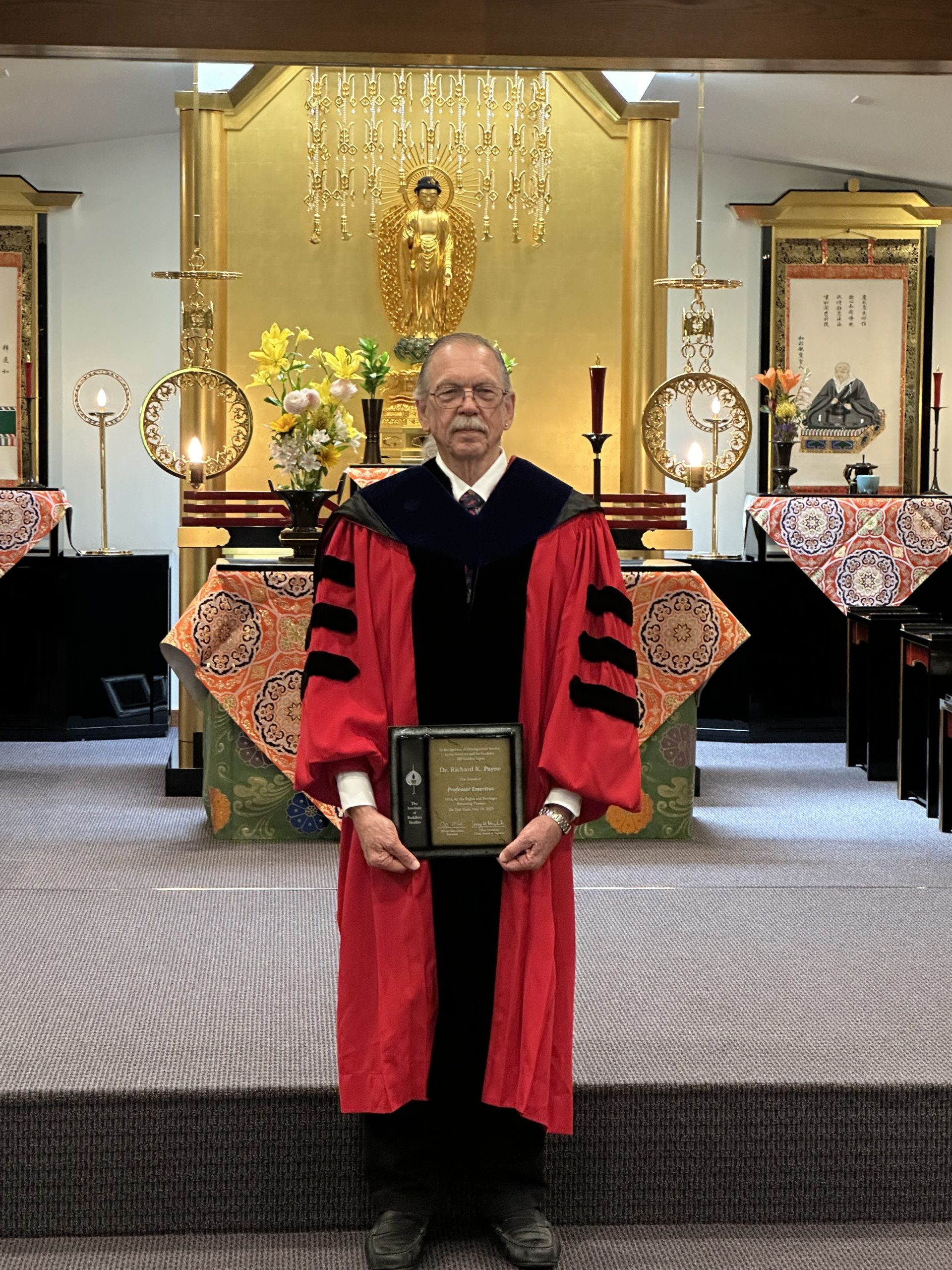Dr. Richard Payne Retiring From IBS
Gesshin Claire Greenwood | June 8, 2023
Dr. Richard K. Payne, who served as Dean at the Institute of Buddhist Studies (IBS) from 1994-2016 and who has been an integral part of institutional and curriculum development and teaching staff at IBS, is set to retire at the end of June.
Dr. Payne began as an adjunct professor at IBS in 1986, and transitioned to administrative assistant to the Dean in 1991. He has published widely on Japanese Buddhism, Esoteric Buddhism, secular Buddhism, psychology, capitalism, and more, and is currently the Yehan Numata Professor of Japanese Buddhist Studies at IBS.
Dr. Payne grew up in Northern California, and was introduced to Buddhism through his contact with the Japanese American community. His mother worked for an agency at the end of World War II that helped Japanese Americans return from the concentration camps and reintegrate, and, as a result, many of his friends were Japanese Americans.
“Because of that, we often went to Obon ceremonies at Japanese temples,” he said. “I thought that it was ordinary. But it seems like it was very different from what other people were experiencing at the time in terms of exposure to the Japanese American community.”
In the 1960s, his interest in Buddhism and Asian religious cultures was reinforced with the prominence of Alan Watts, the internationally known English philosopher who popularized Buddhism to Western audiences, and the counterculture movement.
During his doctoral work at the Graduate Theological Union (GTU) in Berkeley, Dr. Payne studied with Mark Juergensmeyer and Wendy Donager, and, at the University of California, Berkeley, with Lewis Lancaster, Frits Staal, and Michel Strickmann.
Dr. Payne became interested in Shingon Buddhism because it is an Esoteric Buddhist tradition within Japanese religious culture. For his dissertation research, he and his family moved to Mount Koya, where the complex of monasteries is the main center of the Shingon tradition in Japan today. He wrote his dissertation on the Shingon fire ritual, which is the culmination of training as a Shingon priest, and with roots stretching back to Vedic ritual. Dr. Payne described the experience as “intense.”
After graduate school, Dr. Payne taught at IBS, San Jose State University, several local community colleges, and the University of California, Berkeley, before joining the administration of IBS as assistant to the Dean. He was appointed Dean of IBS in 1994, and served in that position until 2016, when Dr. Scott Mitchell took over the position.
Among his many contributions to IBS, the expansion of programs into Soto Zen Buddhism and Theravada Buddhism, as well as the genesis of the chaplaincy program stand out as longlasting and important changes.
Dr. Payne said the chaplaincy program began with interest among IBS students. “I was teaching courses in Buddhist psychology, and some students talked to me and said, ‘You need to have courses in pastoral counseling at IBS,’’’ he said. “When I looked into it, I found that at that time there was almost no one doing pastoral counseling in a Buddhist context. There were no models, there was no groundwork. I remember standing in the GTU bookstore and looking at two 4-foot-wide bookcases that were 10 feet tall and were jam packed with books on Christian pastoral counseling.”
He also found that BCA members “wanted the ministers to be able to provide pastoral counseling.” This, in turn, led him to new work being done toward Buddhist chaplaincy, although as with pastoral counseling, there were no educational programs for Buddhist chaplains at that time.
Determining that IBS needed to develop a Buddhist chaplaincy program, he started conversations with other educators and eventually hired Rev. Dr. Daijaku Kinst to develop the IBS chaplaincy program.
“It was Dr. Payne’s inspiration, his clarity, openness and creativity, as well as his ongoing support, that led to the creation and the success of the Buddhist pastoral care classes,” Rev. Dr. Kinst said. “These classes have enriched the studies of BCA ministry students, formed a key part of the chaplaincy program, and provided a classroom experience in which students could share their experience, questions, challenges, as they entered the field of ministry and chaplaincy. Without his vision and leadership, all of this would not have grown and flourished at IBS and beyond.”
When it came to describing the structure of the IBS curriculum, Dr. Payne explained that he often used the metaphor of a layered wedding cake. He said there are many layers that need to be studied.
“You have a very large first layer,” he said. “That is Indian Buddhism, basic Buddhist education. Then East Asian, then Japanese, then Shin, and then the ministry. To educate people in the ministry, you need this foundation … my desire has always been to make as strong of a scholarly academic program as possible at IBS. Students completing the program should be able to apply Buddhist thought and practice to any area of life, rather than being confined to some topic that is currently trendy.”
Dr. Payne has also published widely on a variety of topics in Buddhism, especially on the subjects of ritual, Esoteric Buddhism, ritual studies, language in Buddhist practice, capitalism, and secular Buddhism. Some of his book titles include “Secularizing Buddhism: New Perspectives on a Dynamic Tradition,” “Language in the Buddhist Tantra of Japan,” and “How Much Is Enough? Buddhism, Consumerism, and the Human Environment.”
He said the thread connecting his diverse research subjects is an interest in addressing the “holes” in academic research, the absence of scholarly attention, and what questions scholars aren’t asking.
“Richard Payne’s academic achievements and voluminous writings are, of course, noteworthy,” IBS President Rev. Dr. David Matsumoto said. “It’s all the more astounding, therefore, that his scholarly productivity took place at the same time that he ran IBS.
“Richard served as the IBS Dean for over 25 years,” Rev. Dr. Matsumoto continued. “During his tenure, he essentially carried out the responsibilities of academic dean, IBS president, budget director, head of HR, and IBS ambassador, as well as mentor for many aspiring scholars and practitioners. As the editor-in-chief of the Pacific World journal and principal editor of the Pure Land Buddhist Studies Series and Contemporary Issues in Buddhist Studies, he single-handedly established a world-class publication program at IBS.
“Richard Payne’s impact on IBS and the world of religious scholarship is considerable and will be felt for many years to come,” Rev. Dr. Matsumoto said.

